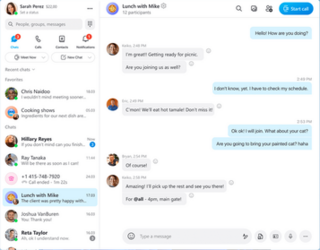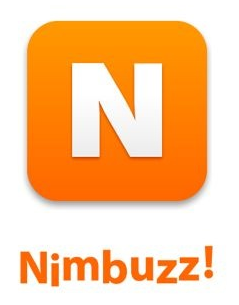Voice over Internet Protocol (VoIP), also called IP telephony, is a method and group of technologies for voice calls for the delivery of voice communication sessions over Internet Protocol (IP) networks, such as the Internet.
Interactive voice response (IVR) is a technology that allows telephone users to interact with a computer-operated telephone system through the use of voice and DTMF tones input with a keypad. In telephony, IVR allows customers to interact with a company's host system via a telephone keypad or by speech recognition, after which services can be inquired about through the IVR dialogue. IVR systems can respond with pre-recorded or dynamically generated audio to further direct users on how to proceed. IVR systems deployed in the network are sized to handle large call volumes and also used for outbound calling as IVR systems are more intelligent than many predictive dialer systems.
A voicemail system is a computer-based system that allows people to leave a recorded message when the recipient is unable to answer the phone. The caller is prompted to leave a message and the recipient can retrieve said message at a later time.

Skype is a proprietary telecommunications application operated by Skype Technologies, a division of Microsoft, best known for VoIP-based videotelephony, videoconferencing and voice calls. It also has instant messaging, file transfer, debit-based calls to landline and mobile telephones, and other features. It is available on various desktop, mobile, and video game console platforms.

Asterisk is a software implementation of a private branch exchange (PBX). In conjunction with suitable telephony hardware interfaces and network applications, Asterisk is used to establish and control telephone calls between telecommunication endpoints such as customary telephone sets, destinations on the public switched telephone network (PSTN) and devices or services on voice over Internet Protocol (VoIP) networks. Its name comes from the asterisk (*) symbol for a signal used in dual-tone multi-frequency (DTMF) dialing.
In telephony, an automated attendant allows callers to be automatically transferred to an extension without the intervention of an operator/receptionist. Many AAs will also offer a simple menu system. An auto attendant may also allow a caller to reach a live operator by dialing a number, usually "0". Typically the auto attendant is included in a business's phone system such as a PBX, but some services allow businesses to use an AA without such a system. Modern AA services can route calls to mobile phones, VoIP virtual phones, other AAs/IVRs, or other locations using traditional land-line phones or voice message machines.

Skype for Business Server is real-time communications server software that provides the infrastructure for enterprise instant messaging, presence, VoIP, ad hoc and structured conferences and PSTN connectivity through a third-party gateway or SIP trunk. These features are available within an organization, between organizations and with external users on the public internet or standard phones.

A VoIP phone or IP phone uses voice over IP technologies for placing and transmitting telephone calls over an IP network, such as the Internet. This is in contrast to a standard phone which uses the traditional public switched telephone network (PSTN).
Gizmo5 was a voice over IP communications network and a proprietary freeware soft phone for that network. On November 12, 2009, Google announced that it had acquired Gizmo5. On March 4, 2011, Google announced that the service would be discontinued as of April 3, 2011.

Jajah was a VoIP provider, founded by Austrians Roman Scharf and Daniel Mattes in 2005. The Jajah headquarters was located in Mountain View, CA, USA, and Luxembourg. Jajah maintained a development centre in Israel. On 23 December 2009, it was announced that Jajah had been bought by Telefónica through its subsidiary Telefónica Europe. In December 2013, Telefónica announced that Jajah would shut down at the end of January 2014.
This is a comparison of voice over IP (VoIP) software used to conduct telephone-like voice conversations across Internet Protocol (IP) based networks. For residential markets, voice over IP phone service is often cheaper than traditional public switched telephone network (PSTN) service and can remove geographic restrictions to telephone numbers, e.g., have a PSTN phone number in a New York area code ring in Tokyo.
Truphone is a GSMA-accredited global mobile network that operates its service internationally. The company is headquartered in London and has offices in ten other countries, being spread across four continents.
Skype is a Voice over Internet Protocol (VoIP) system developed by Skype Technologies S.A. It is a peer-to-peer network where voice calls pass over the Internet rather than through a special-purpose network. Skype users can search for other users and send them messages.
Skype offers a number of features based around calling, messaging, video chat, and file and screen sharing. The following is a partial list of Skype's features:

Rebtel is a Swedish technology company founded in 2006 by Hjalmar Winbladh and Jonas Lindroth which sells products and services to migrants and international travelers. Its services include international calling, messaging and mobile payment delivered in applications for Android, iPhone, and Windows Phone.

Jaxtr was a social communications company that melds together global calling, SMS, and social networking. Founded by Phillip Mobin and Touraj Parang in October 2005, Jaxtr uses Voice over Internet Protocol to offer competitive rates as well as free international and long distance calling. Some key differentiators for Jaxtr in its market include allowing phone-to-phone calls to and from any mobile and landline phones, offering social networking focused on voice, requiring no software downloads or access pins, and giving users local Direct Inward Dialing (DID) phone numbers. Offered in 56 countries, these numbers allow users in those countries to dial a local phone number which would ring a long distance or international destination phone. Jaxtr also offers users a set number of global SMS messages each month.
Zingaya was launched in North America on September 14, 2010 at the DEMO conference. Zingaya provides next generation click-to-call services. Using Adobe Flash-based Voice over Internet Protocol technology, the company provides an embedded widget that forwards an end user through a VoIP call to landlines, mobile phones, Skype accounts, or other computers – whichever the website operator has specified. There’s no download, and no phone is required for the caller. A visitor to a website simply clicks the “Call” button on the widget.

Nimbuzz is a proprietary cross-platform instant messaging and social media and mobile payment developed by Kuraakani Online Private Limited, with the origins of its technology dating back to the early 2000s. As of March 2013, Nimbuzz had 150 million users in 200 countries. By April 2014, Nimbuzz was growing by more than 210,000 new registrations per day. In October 2014, now with over 200 million users, New Call acquired 70% of Nimbuzz, valuing the app at $250 million. Under CEO Sujit Acharya's leadership, Nimbuzz suite of applications enables users to enjoy end-to-end encrypted free calls, instant messaging, games, file sharing, social networking, mobile payments & movies on their mobile device. Nimbuzz has more than 3 million lines of code. Initially, Nimbuzz offered discounted calling rates to most countries in the world. The platform processed more than a billion call minutes and in excess of 100 billion messages a month.

Upptalk was a proprietary voice-over-IP service and software application that provided mobile phone numbers in the cloud and allows users to call or text any phone for free whether or not the device receiving the calls and texts has the Yuilop application. The service was discontinued in 2017 and even its domain was abandoned.
Comparison of user features of messaging platforms refers to a comparison of all the various user features of various electronic instant messaging platforms. This includes a wide variety of resources; it includes standalone apps, platforms within websites, computer software, and various internal functions available on specific devices, such as iMessage for iPhones.








